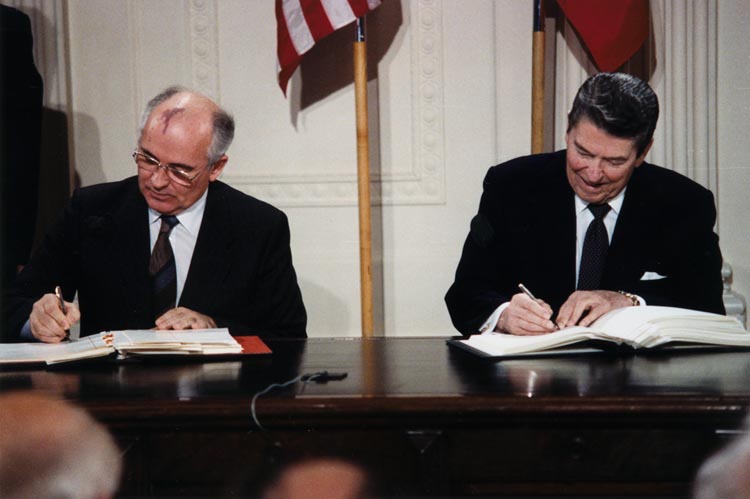Key Points:
- The Trump administration has indicated it will leave the INF if Russia doesn’t come into compliance with the treaty
- China’s military advancement is a significant consideration when reevaluating the INF
Background:
In 1987 President Ronald Reagan and Soviet leader Mikhail Gorbachev signed the Intermediate Range Nuclear Forces (INF) Treaty, prohibiting land-based cruise or ballistic missiles with a range between 311 and 3,420 miles. Exempt from the treaty were air or sea launched munitions. The agreement was a reaction to the short flight time and limited warning that existed between the Soviet and NATO forces deployed in close proximity during the Cold War in Europe. As a result, tensions were eased; it is estimated over 2,500 ground-based cruise missiles were destroyed.
What Has Happened:
This week, Secretary of State Pompeo indicated that the U.S. will abandon the INF in 60 days unless Russia begins a verifiable process to dismantle the missiles that violate the treaty. In line with Russia’s predictably aggressive international behavior, Putin maintains a focus on improving his growing military modernization. Despite U.S. led international pressure, Putin publicly boasted earlier this year that Russia would soon have a nuclear-powered cruise missile capable of reaching the U.S. Additionally, the Trump administration is concerned about burgeoning Chinese military capabilities and modernization -a justification for nullifying the treaty and structuring a new one. Secretary Pompeo has correctly assessed that “there is no reason the United States should continue to cede this crucial military advantage to revisionist powers like China.”
Why it Matters:
The Cold War treaty has outlived its value. It must be modernized to match the concomitant modernization realities of our near peer global competitors, Russia and China. In 1987, China was not a consideration. It is today and “a new INF” must acknowledge and reflect that challenge. Russian belligerence in the Ukraine, Syria, and potentially in the Baltics, as well as evolving expeditionary Chinese military activities in the South China Sea, have shown their penchant for pushing boundaries and indifference for international law and standards. These threatening military capabilities coupled with a blatant disregard for normative international behavior practically demand a do-over of the INF.
“Policy should lead actions and the ambiguity of the administration’s goals can be risky. The Secretary of State should announce clear unequivocal policy that we desire to adhere to the INF and our goal is to achieve a Russian roll back while simultaneously seeking to negotiate a similar bilateral agreement with China – then lay out the alternative to pursuing the policy options above. The actions taken by the administration risk producing an arms race with cost imposition. Who is in a better economic position to afford and win an arms race? The United States is currently upgrading its strategic deterrent Triad and will continue to do so while maintaining superiority or parity with its global competitors. The U.S. will accept the cost burden to defend this nation but seek, with Russia and China, to pursue more peaceful economic objectives rather than rekindle a global arms race. “
Lieutenant General Frank Kearney, Academy Securities’ Advisory Board Member.
Original Post 12/11/2018


